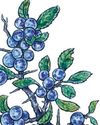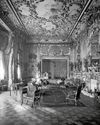Could these two historic houses galvanise the market into action?

Setting the pace, at a guide price of ‘excess £12 million’ through Knight Frank’s country department (020–7861 1078), is glorious, Grade I-listed Dewlish house at Dewlish, near Milborne St Andrew, one of Dorset’s most beautiful country houses. It’s being sold— together with its surrounding 296-acre estate—for the first time in 57 years and only the second time since it was built.
The picturesque hamlet of Dewlish is scattered over the western slopes of the valley of the Devil’s Brook in the heart of Dorset’s hardy Country, 2½ miles from Milborne St Andrew and eight miles from the county town of Dorchester. According to the Rev hutchins’s seminal history of Dorset, it was here, on the site of a large Roman villa, that Thomas Skinner built Dewlish house in the Queen Anne/Georgian style in about 1702.
The design blends the characteristics of both periods in its main front of Purbeck stone, its south-east end wall of ham hill ashlar and its south-west front of brick. The north-west end wall is more modern, having been added since the removal of an 18thand 19th-century service wing sometime in the 20th century.
Skinner died in 1756 and was buried in nearby Winterborne Stickland church, rather than Dewlish’s parish church of All Saints,as he would have preferred. Local legend has it that his ghost has often been seen in Stickland church, where he knocks books off the altar and generally makes his disgruntled presence felt.
Denne historien er fra June 19, 2019-utgaven av Country Life UK.
Start din 7-dagers gratis prøveperiode på Magzter GOLD for å få tilgang til tusenvis av utvalgte premiumhistorier og 9000+ magasiner og aviser.
Allerede abonnent ? Logg på
Denne historien er fra June 19, 2019-utgaven av Country Life UK.
Start din 7-dagers gratis prøveperiode på Magzter GOLD for å få tilgang til tusenvis av utvalgte premiumhistorier og 9000+ magasiner og aviser.
Allerede abonnent? Logg på

Kitchen garden cook - Apples
'Sweet and crisp, apples are the epitome of autumn flavour'

The original Mr Rochester
Three classic houses in North Yorkshire have come to the market; the owner of one inspired Charlotte Brontë to write Jane Eyre

Get it write
Desks, once akin to instruments of torture for scribes, have become cherished repositories of memories and secrets. Matthew Dennison charts their evolution

'Sloes hath ben my food'
A possible paint for the Picts and a definite culprit in tea fraud, the cheek-suckingly sour sloe's spiritual home is indisputably in gin, says John Wright

Souvenirs of greatness
FOR many years, some large boxes have been stored and forgotten in the dark recesses of the garage. Unpacked last week, the contents turned out to be pots: some, perhaps, nearing a century old—dense terracotta, of interesting provenance.

Plants for plants' sake
The garden at Hergest Croft, Herefordshire The home of Edward Banks The Banks family is synonymous with an extraordinary collection of trees and shrubs, many of which are presents from distinguished friends, garnered over two centuries. Be prepared to be amazed, says Charles Quest-Ritson

Capturing the castle
Seventy years after Christian Dior’s last fashion show in Scotland, the brand returned under creative director Maria Grazia Chiuri for a celebratory event honouring local craftsmanship, the beauty of the land and the Auld Alliance, explains Kim Parker

Nature's own cathedral
Our tallest native tree 'most lovely of all', the stately beech creates a shaded environment that few plants can survive. John Lewis-Stempel ventures into the enchanted woods

All that money could buy
A new book explores the lost riches of London's grand houses. Its author, Steven Brindle, looks at the residences of plutocrats built by the nouveaux riches of the late-Victorian and Edwardian ages

In with the old
Diamonds are meant to sparkle in candlelight, but many now gather dust in jewellery boxes. To wear them today, we may need to reimagine them, as Hetty Lintell discovers with her grandmother's jewellery